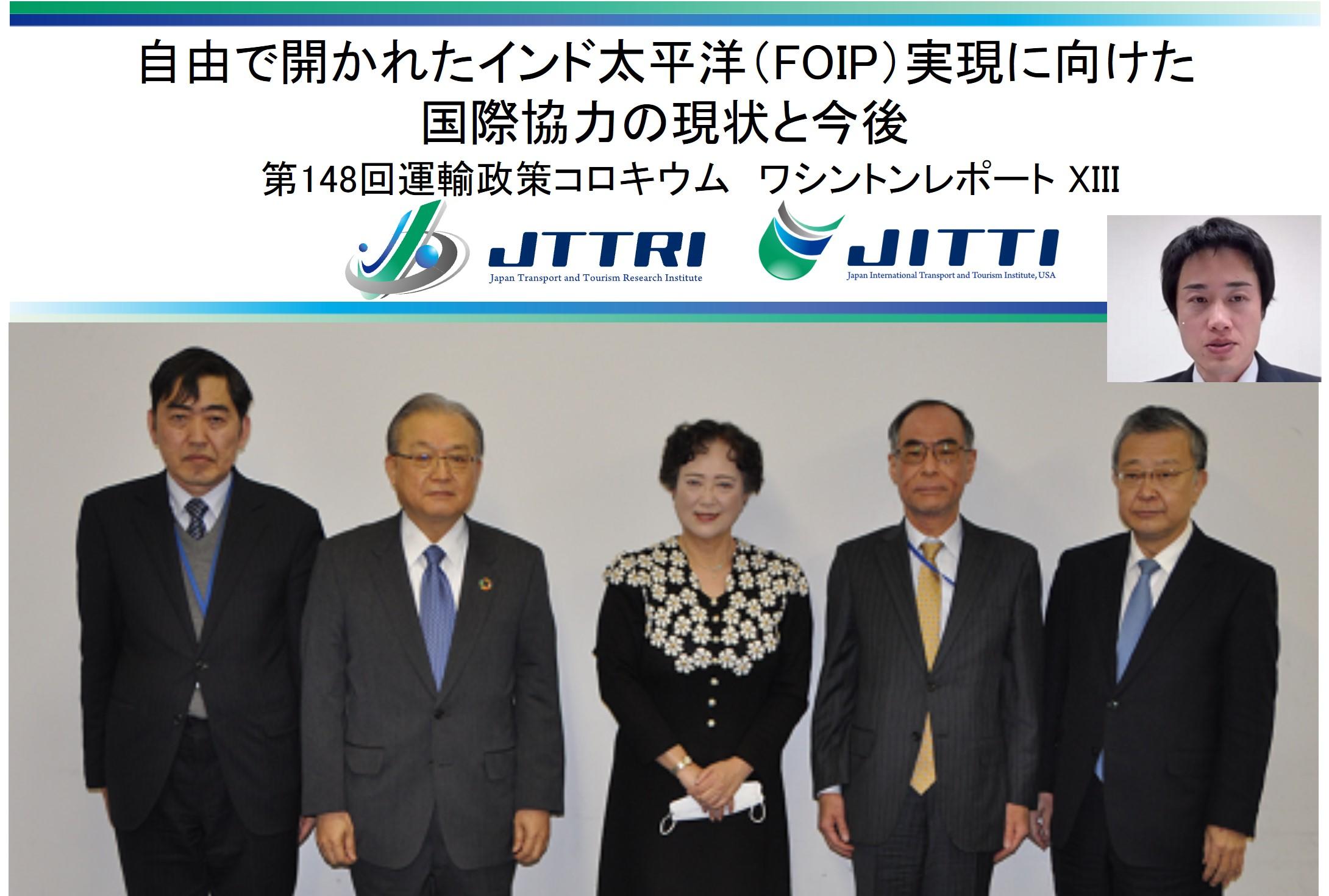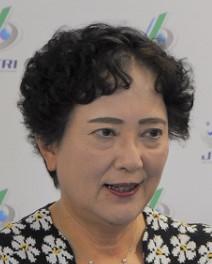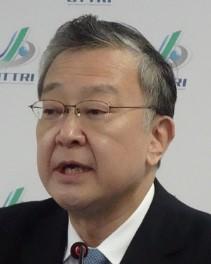Present and Future of International Cooperation for the Realization of a Free and Open Indo-Pacific (FOIP)
- Colloquium
- International Activities
The 148th Transport Policy Colloquium -Washington Report XIII-(Online)※Language : Japanese


| Date / Time | Tue, Feb 01,2022 10:00-12:00 |
|---|---|
| Event Number | The 148th |
Event Summary
Japan has made the "Free and Open Indo-Pacific (FOIP)" an important basic policy of its foreign policy. From the perspective of (1) "Rule of Law and Freedom of Navigation," and (3) "Commitment for Peace and Stability" of the three pillars of the FOIP among other things, we discussed the current status and issues related to the international support of the Japan Coast Guard (JCG) to ASEAN countries including the improvements of coast guard capabilities and disaster prevention capabilities, and the donation of vessels with a consideration to the relationship with China and the coordination with the U.S. The international support of the JCG reflects the recent development of international operations of the JCG. The international support of Japan Coast Guard simultaneously realizes both Japanese foreign policy (the FOIP) and ocean policy (the Third Basic Plan on Ocean Policy) because of the commonalities between them. By placing emphasis on the rapidly increasing tension between Japan and China over the East China Sea, Japan needs to achieve the maritime security specified in the Basic Plan through an international support to Southeast Asian countries that places Japan in an advantageous position against China. The international cooperation of Japan Coast Guard with ASEAN countries is also conducive to the other pillar of the FOIP, (2) "Pursuit of Economic Prosperity", and it contributes to economic security in line with the directions of the Fourth Basic Plan on Ocean Policy.Program of the seminar is as the following
| Opening Remarks |

SHUKURI Masafumi |
|---|---|
| Lecturer |

OKAMOTO Yasuhiro |
| Commentator |

KANEHARA Atsuko |
| Q&A session |
<Moderator> YAMADA Teruki
Distinguished Research Fellow, Senior Director, International Affairs Department Japan Transport and Tourism Research Institute (JTTRI) |
| Closing Remarks |

OKUDA Tetsuya |
Outline of the seminar
Result of the dayResearch Fellow Yasuhiro Okamoto of the Japan International Transport and Tourism Research Institute (JITTI-USA) gave a research presentation on "The Current Status and Future of International Cooperation for the FOIP".
[Chapter 1: FOIP]
• The FOIP states that a key for stability and prosperity of the international community is dynamism that is created by combining "two continents", the rapidly-growing "Asia" and "Africa" with huge potential growth, and "two oceans", the free and open "Pacific Ocean" and "Indian Ocean", and it aims to exercise diplomacy with comprehensive concept of the "two continents" and the "two oceans."
[Chapter 2: Mission and Organizational Overview of the Japan Coast Guard]
• The mission of the Japan Coast Guard (JCG) is to ensure public safety by combating smuggling, stowaways, illegal operations, and terrorism, as well as to guard Japan's territorial waters and EEZ, and to rescue maritime victims and protect the marine environment. In the event of accidents such as fires, collisions, boarding and sinking of vessels, or natural disasters such as earthquakes, typhoons, torrential rains, and volcanoes, the JCG conducts disaster response activities to protect lives and property. In addition, the JCG collects, manages, and provides maritime information, ensures the safety of marine traffic, and conducts marine accident prevention activities.
[Chapter 3: International Operations and Support Activities of JCG]
• Many maritime issues are difficult for a single country to solve, and it is important to deal with them in cooperation and collaboration with other countries connected by the sea. Therefore, the JCG is committed to multilateral and bilateral coordination and cooperation.
• Japan is promoting the provision of patrol vessels to the coast guard agencies of Southeast Asian countries as part of its efforts to realize a free and open Indo-Pacific region. For examples, the report introduces the provision of patrol vessels to the Philippines and Vietnam. In addition to the provision of such equipment, the report also introduces the JCG's support measures for national coast guard agencies, including the establishment of the JCG Mobile Cooperation Team, a dedicated department within the JCG to support capacity building, and the JCG Policy Program, a collaborative program implemented by the JCG and the National Graduate Institute for Policy Studies with the cooperation of the JICA and Nippon Foundation.
[Chapter 4: China's Economic Presence in ASEAN]
• While countries such as the Philippines, Vietnam, Malaysia, and Indonesia have maritime disputes with China in the South China Sea, China is the largest trading partner of each country.
• We need to understand that although ASEAN countries are at odds with China in asserting their maritime rights in the South China Sea, China's One Belt, One Road money is very attractive for their economic growth, and the fact that China is their largest trading partner puts them in the difficult situation of having a problem in the South China Sea with China being a very important country economically.
[Chapter 5: U.S. Assistance Activities]
• Multiple countries provide support to Southeast Asian coast guard agencies, and in order to maximize the effectiveness of support from each country, it is necessary to eliminate duplication and other inefficiencies, and provide more effective and efficient support in a coordinated manner.
• Regarding ODA, preliminary figures for 2020 show U.S. aid in dollar terms at $35.7 billion, about 1.8 times Japan's $20.3 billion.
• The security assistance budget is managed by two departments, the Department of State and the Department of Defense, with the Department of Defense exceeding the Department of State in amount.
• The JCG, which is engaged in relief activities in the region, needs to understand the situation in which multiple agencies, including the State Department and the Department of Defense, engage in aid activities as U.S. agencies operating in the countries to be assisted, and to promote cooperation with organizations other than the U.S. Coast Guard.
[Chapter 6 Summary (Recommendations)]
• China is not only the largest trading partner of each country, but also a huge funder of the One Belt, One Road initiative, which has greatly benefited the economic development of ASEAN countries. There is no question that the ASEAN countries would like to avoid inadvertently provoking China, and would like to strengthen their relationship with China with regard to the economy.
• It is important for Japan to consider what kind of support would be welcome and effective, based on sufficient communication with the recipient countries.
• It is necessary to enhance the effectiveness of assistance in cooperation with the U.S. and other countries, and at the same time, to seek ways of providing assistance that are easy for recipient countries to accept. We may be able to explore ways to collaborate with the U.S. and other countries, and to provide support through a multilateral framework.
• In the U.S., with regard to support for the maritime security sector, it is necessary to cooperate not only with the State Department and the Department of Defense, which manage the foreign assistance budget, but also with other agencies, including the U.S. Coast Guard, which is the implementing agency for the assistance.
• While there is a need for collaboration with organizations other than the US Coast Guard, it is necessary to work more closely with the Ministry of Foreign Affairs, Ministry of Defense, JICA, and others in Japan, and to pursue more coordinated support from multiple U.S. agencies.
[Comment by Commentator Kanehara]
• In response, commentator Professor Atsuko Kanehara of the Faculty of Law at Sophia University (Director of the Japan Transport and Tourism Research Institute) explained the following, based on Researcher Okamoto's report.
Part 1
[1. Foreign Policy (FOIP) and Ocean Policy (Third Basic Plan on Ocean Policy)]
• Japan's foreign policy of the FOIP and Japan's Ocean policy as indicated in the Third Basic Plan on Ocean Policy (Basic Plan) have much in common with each other and will be realized simultaneously by taking various measures.
• The nature of the Basic Plan proclaim that the country will strive for world peace, stability, and prosperity through sharing values such as freedom, democracy, fundamental human rights, and the rule of law. The Basic Plan also positions the FOIP as a means of maintaining and assessing maritime order based on the rule of law and freedom of the sea, and states that cooperation with other countries is necessary to achieve comprehensive maritime security.
• It is also clear that the FOIP is consistent in the nature and various measures of the Basic Plan, and that because of these commonalities, they will be realized simultaneously.
[2. Functions and missions of JCG: Evolution from domestic to international operations]
• Since its establishment after World War II, the JCG has been fulfilling its functions and duties as indicated in Articles 2 and 5 of the JCG Act. Recent years have been characterized by the development of the JCG's international operations.
• The ocean has an international and external character. It has both positive and negative aspects. On the positive side, the sea allows us to connect with other countries internationally and to implement international cooperation. On the negative side, through the sea, we are exposed to threats from other countries and can engage in harmful activities.
• Japan is surrounded entirely by the sea, and the JCG operates in the international window of the sea. In other words, the JCG plays a part in Japan's diplomacy, and it is inevitable that the JCG will play a part in the realization of the FOIP. Such activities of the JCG can be said to take full advantage of the positive aspects of the international and external nature of the sea.
• The negative aspects of the international and external nature of the sea include the following. The recent significant increase in Sino-Japanese tensions over guarding territorial water around the ocean near the Senkaku Islands is a typical example of this negative aspect. In addition, each of the Southeast Asian countries has established close economic ties with China, and "China for Japan" appears on the negative side of this relationship.
Part 2
[1. Japan-China Relations in the Context of Guarding Territorial Waters]
• On February 1, 2021, China enacted the Chinese Coast Guard Law. What is most important here is not only to point out the violation of international law of the said law on the table, but also to recognize how China actually and concretely infringes on our national interests by applying the Coast Guard Law. The most serious situation we have in mind is "the use of force by Chinese vessels against JCG vessels and Maritime Self-Defense Force vessels in Japan's territorial waters near the Senkaku Islands."
• According to data released by the JCG, Chinese public vessels (vessels belonging to the government) and warships have been constantly staying in the contiguous zone near the Senkaku Islands (24 nautical miles) and entering the territorial waters (12 nautical miles) with 4 to 100 vessels per month for more than 10 years.
• Prime Minister Kishida's policy speech on January 17, 2022, also states, "We will strengthen our maritime security system, including cooperation between the Japan Coast Guard and the Self-Defense Forces, as well as enhance island defense capabilities and other measures to strengthen our preparedness for the Nansei Islands.”
• Never has effective guarding territorial water been a grave, serious, and urgent issue in our relations with China as it is now. Of course, it is undeniable that there are aspects of cooperation with China in terms of protection of the marine environment and maritime salvage, and we must also do our utmost to avoid any confrontation with China. However, we need to look at reality.
[2. Achieving maritime security through FOIP (international assistance)]
• On the one hand, respect for close economic ties between Southeast Asian countries and China requires consideration of not provoking China. On the other hand, Japan must gain an advantage over China in international assistance in order to win the cooperation of Southeast Asian countries. In addition to the use of multilateral frameworks, there are two other ways to achieve this, for example.
• First, both the Basic Plan on Ocean Policy and the FOIP are based on the nature of liberal democracy, fundamental human rights, the rule of law, and freedom of navigation, and it is the sharing of these universal values with Southeast Asia that is at the root of Japan's international support. Second, Japan should strongly emphasize to Southeast Asian countries that Japanese assistance under the FOIP is a win-win situation that realizes mutual benefits.
[Prospects for Fourth Basic Plan on Ocean Policy]
• Given the frequent discussion of economic security in recent years, it is quite predictable that economic security will be one of the key policy goals in the Fourth Basic Plan on Ocean Policy.
• The JCG's international support includes building the ability to enforce maritime law, humanitarian assistance, disaster relief, etc. As a strengthening of cooperation with allied and friendly countries, it will surely contribute to securing the stable use of Japan's important sea lines of communication and strengthening the international maritime order, which will promote international trade and investment and improve the business environment. It will also contribute to economic security.
• The JCG's international support has enormous potential and mission to open the vision of the Basic Plan with an eye on the future fourth Basic Plan on Ocean Policy which will likely to have a greater emphasis on economic security.
[Question and answer session]
○ How should China be incorporated into the FOIP?
• The program will be implemented as a win-win situation that benefits both the supported and the assisting party. By constantly making Japan's stance clear, reassuring Southeast Asian countries, and propagating the universal values of the international community, Japan will drive China into a corner where it cannot oppose, and if China tries to keep pace in any way, Japan will take the stance that it is welcome.
○ What are the discussions at the North Pacific Maritime Security Forum on Chinese Coast Guard Law and other issues?
• In the maritime security cooperation framework, we are discussing how we can cooperate and solve practical problems that each country is facing now.
This issue can be expanded a bit to become the pressing question of how to deal with the Chinese crisis in the East China Sea, or more directly, how to ensure effective territorial sea security.
○ What is the most effective approach to increasing the number of internationally accepted rule of law comradeship countries?
• It is clear that the countries of Japan, the U.S., Australia, and Europe have interests and stake in the South China Sea, even if they are not the littoral states of the South China Sea, and that is why we must continue to appeal to China to follow the law, backed by force in a peaceful sense, and with strength, persistence, and perseverance.
○ What is the role of the JCG in conducting FOIPs with island nations in the Pacific and Indian Oceans, and what are the key points to keep in mind in relations with China?
• The FOIP's footing at all times is largely due to the efforts of the Ministry of Foreign Affairs and the JCG, which provide detailed assistance tailored to the actual conditions of each specific country. In accordance with this, the FOIP will probably provide tailor-made assistance, so to speak, to Indian Ocean countries and Pacific Islands countries as well. In order to counter the growing influence of China in the Pacific Islands countries, it is essential to support such a policy.
• The JCG will work together in the field and will consider measures to support individual technical discussions with the implementing agencies of other countries.
○ In building relations with ASEAN countries, how should universal values such as democracy and the rule of law be shared? Also, what is the potential for capacity building of ASEAN countries through Japan-U.S. cooperation?
• The values that Japan believes in are those that the international community has universally believed in. It is hard to imagine an argument against universal values. Rather, there are differences in achievement and means, and these are negotiable with the other party as something that can be adjusted.
• It is a case-by-case basis, as each country has a different foreign policy and policy toward China.
○ What is the basis for China's claim to extensive territorial waters in the South China Sea?
• China claims that it is a historically recognized right. It also relies on old sea area maps and other evidence, but the value of those pieces of evidence is questionable. The arbitral tribunal on the South China Sea dispute held that, having become a party to UNCLOS, there is no legal room to assert historical rights in contravention of it.
(End)


